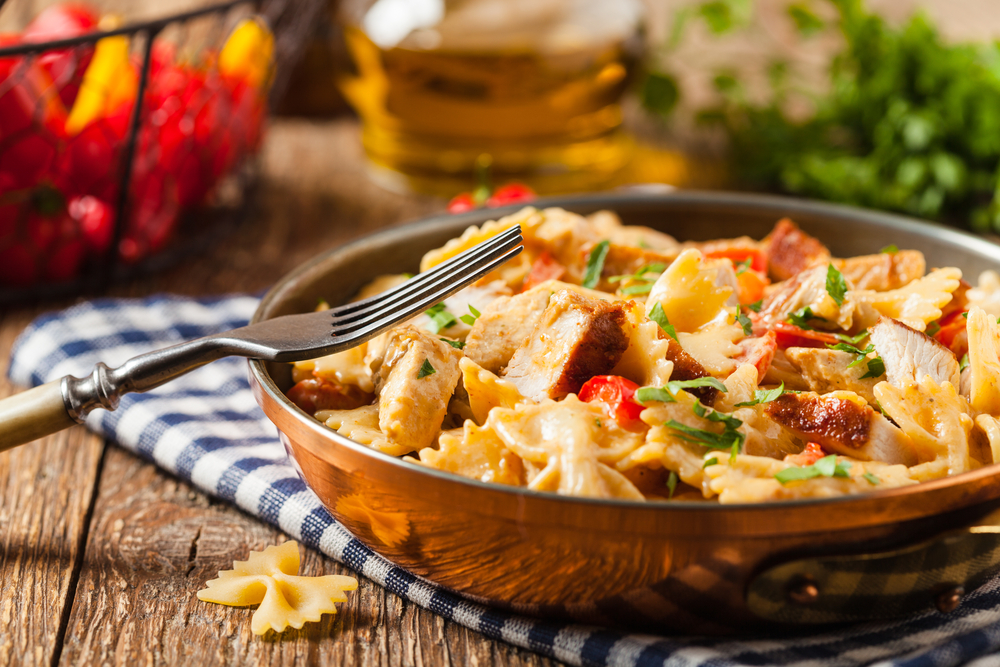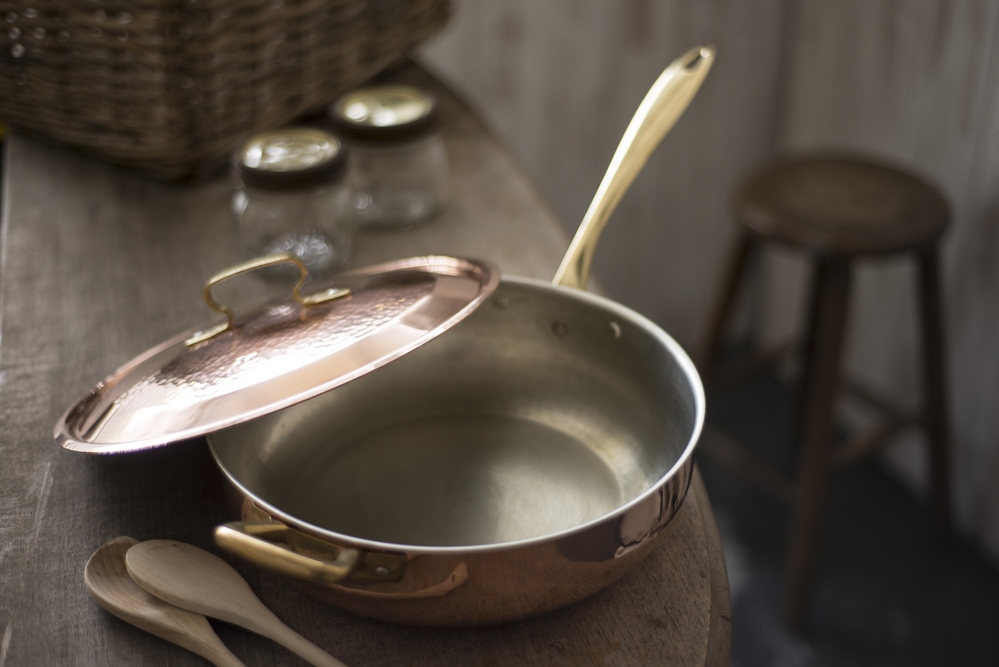Copper pans need regular cleaning to ensure they stay looking shiny and bright. Whether you’ve just spent a couple of hundred pounds on a brand new copper pan or are looking to restore a hundred-year-old antique model, you’ll need to know how to clean copper pans to make sure that you do not cause any damage.
Here’s all you need to know about cleaning copper and what causes that dreaded tarnish.
Why Do Copper Pans Need Polishing?
Copper pans are renowned for their beauty, excellent heat conductivity and exceptional durability. They are also notorious for being rather high maintenance, requiring regular polishing. While you probably like to keep your other expensive cookware items nice and shiny, copper pans require quite a bit more effort.
This is because copper is a reactive metal. Over time it reacts with its surrounding environment and becomes tarnished, even if you haven’t been using it. Slowly the copper surface of your pan will react with oxygen, creating a surface build-up of copper oxide.
The resulting loss of brightness caused by this chemical reaction is known as tarnish. If you want to keep your copper bright, light and shiny, you’ll need to remove this brown-black discolouration.
How to Clean Your Copper Pans
Now that you know why your copper pans become tarnished, it’s time to look at some of the most effective ways to clean your copper pans without damage. Here are some of the best ways to clean copper pans using homemade cleaning solutions, as well as store-bought ones.
Before Getting Started
Before you start mixing up a solution to clean your expensive copper pans, it’s important to consider the manufacturer’s recommendations to ensure that you do not invalidate your warranty.
You should also double-check what your copper pans are lined with, as this may affect your choice of copper cleaner. Recently manufactured copper pans are lined with stainless steel, so you should clean the interior with an appropriate cleaner for your stainless steel pans. Older and vintage copper pans will likely be lined with tin.
Tin is more delicate than stainless steel and also has a low melting point, so be sure to look for signs of any deterioration. If your tin-lined copper pan is starting to deteriorate inside, you should take your pan to be re tinned.
Note that copper jam pans do not have linings. This is because the high sugar content in jam stops a reaction from occurring between the fruit and the copper surface, so you can polish them inside and out using your homemade solutions below. All other types of copper pans will be lined inside.
Method 1: Copper and Brass Polish
While you probably have all or most of the following ingredients to make your own copper cleaner, you may want to try out a ready to use store-bought polish.
Take your clean copper pan and apply the polish to the exterior using a soft cloth. Rub in the polish using small circular motions before rinsing if necessary. Dry and buff to a polished finish with a soft, clean, lint-free cloth and plenty of elbow grease. Note that some store-bought copper cleaners require rinsing and have a special sealant to help to prevent tarnishing, so make sure that you read through the instructions before using them.
Method 2: Salt and White Vinegar
If your copper pan has any cooked-on residue or carbon deposits, you may need a slightly more effective method. Salt and white vinegar is a good way to restore old copper cookware that has seen better days. As the salt acts as a light abrasive, you won’t want to use this method on new copper pots and pans with minimal tarnishing. Use fine table salt to scrub rather than coarse salt to prevent scratching.
Rinse the exterior of your clean copper cookware under running water before sprinkling it with table salt. Slowly pour over white wine vinegar without washing all of the salt away. Dampen a clean, soft cloth with the white vinegar and gently scrub your pan all over. Rinse thoroughly, then dry with a clean, lint-free cloth before buffing your pan to a polished finish.
Note
Do not let your pan sit with the salt on it as this could cause salt pitting, start rubbing straight away and rinse immediately afterwards. You can also add salt to the juice of half a lemon and then rub the mixture over your tarnished copper or use a spray bottle.
Method 3: Ketchup
As tomatoes are acidic, ketchup makes a great copper cleaner. Not a ketchup fan? You can also use tomato paste, but we find that the texture of ketchup makes it easier to coat your pan with.
Take a clean copper pot, turn it upside down and squirt ketchup over the base. Rub it in by hand, all around the sides, making sure that you have an even coating with all tarnish completely covered. Leave it to work for a couple of minutes, then wipe off the excess, rinse thoroughly, dry and buff the exterior of your pan with a clean cloth.
Method 4: Lemon Juice and Baking Soda

Baking soda is a great cleaning ingredient, while the citric acid from the lemon juice will break up the copper oxide, removing discolouration for clean copper cookware. You could also substitute the baking soda for fine salt if you have run out of baking soda.
Juice your lemons and stir in a couple of tablespoons of baking soda until dissolved. Take a soft cloth, soak it in your lemon juice mixture and apply liberally to your copper pots. Rub the cloth gently over your pan’s surface to ensure full coverage with the solution. Rinse thoroughly, dry and polish with a lint-free cloth.
Tips to Keep Your Copper Pans Looking Good
Here are our top tips on how to clean copper pots and help you to keep your expensive copper cookware looking at its best.
Hand Wash Only
You should never clean copper pots in the dishwasher. The high-pressure water jets and dishwasher cleaning products can easily damage your copper cookware resulting in a tarnished surface. Cleaning copper pans by hand is a great method instead: hand washing your copper pots and pans is the best way to ensure that they remain in excellent condition for years to come.
Do Not Use Abrasives
Copper is a soft metal that can be easily damaged by abrasive substances. For this reason, you should avoid using any harsh cleaning agents or steel wool cleaning accessories. Doing so could easily scratch the finish of your copper pans.
Clean Promptly After Use
Clean your copper pans right after use. As soon as you can comfortably handle your pan, wash it with mild dish soap, warm water and a soft cloth. Rinse thoroughly and dry. Cleaning your copper pans straight after use will help to keep them looking brighter for longer and prevent discolouration from spills and coming into contact with various ingredients in your kitchen.
Do Not Heat up Empty
Copper is an excellent heat conductor, so it heats up extremely rapidly. While you may stick your cast iron pans on your hob for a couple of minutes before adding your food, you should never preheat your copper cookware. Doing so could damage them as they will heat up almost instantaneously. So make sure that you avoid placing empty copper pans on your hob to keep them in prime condition.
Seal Your Copper Cookware
Once you have cleaned your copper pans, you can help to prevent tarnishing by sealing the exterior with a thin layer of mineral oil. This will prevent the air from coming into direct contact with your pan, preventing oxidation from occurring. It is important that you do this immediately after drying and polishing your copperware for it to be effective.
Start Cleaning Your Copper Pans
While copper pans are not the easiest to maintain, their excellent performance, fantastic looks and impressive durability make it well worth spending the extra time keeping them in prime condition.
With our copper cleaning tips and tricks, you now know all there is to know about how to clean copper pans easily and effectively, so you can save yourself time and effort keeping your copper cookware looking shiny and new.

